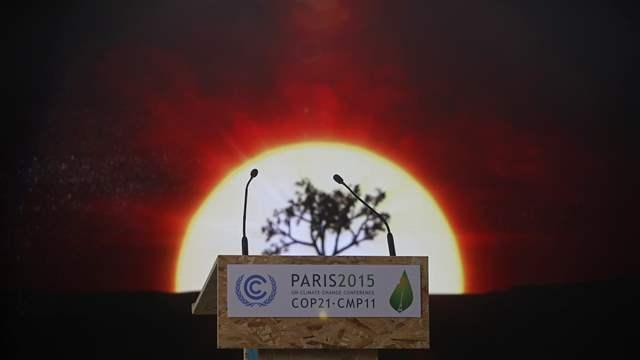As world leaders in Paris seek to establish a climate accord for the future, it is likely that sector-level contributions will not be a part of the target discussions and agreements. Since agriculture is one of the foremost drivers and burden-bearers of climate change, its omission could be detrimental.

Pictures are displayed on a screen behind the podium of a conference room at the venue for the upcoming World Climate Change Conference 2015 (COP21) at Le Bourget, near Paris, France (Christian Hartmann).
In a new brief, Brookings Senior Fellow John W. McArthur explains the intense relationship between agriculture and climate change and highlights opportunities in Paris to nail down specific policies to promote climate-smart agriculture.
Read the related paper (PDF) »
McArthur lists the four core challenges surrounding this complex relationship:
- The word needs to increase its food production by 50 percent in order to meet the needs of the growing population.
- Agriculture accounts for about 14 percent of all greenhouse gas emissions.
- Agriculture is the sector most susceptible to changes in climate patterns, due to the fact that it depends on the biophysical environment.
- The human costs of climate are unequally spread—the societies least able to withstand shocks to agriculture are already experiencing them.
McArthur specifically argues that it “is a global imperative to promote ‘climate-smart agriculture’ (CSA).” Specific examples of CSA include better grassland management, restoration of degraded land (through water conservation, revegetation, etc.), and improving cropland management (through crop rotation, better nutrient management, etc.).
For agriculture, the real work will take place in country- and landscape-specific strategies to tackle interwoven efficiency, adaptation, and mitigation challenges while promoting food security.
He also argues that country-level actions in the Intended Nationally Determined Contributions (INDCs) will be the “most important COP 21 outcome for agriculture,” but, currently, they lack clear benchmarks specific to the agricultural sector and vary among countries. McArthur believes that cooperation among countries will be key to long-term success on climate change. We need to translate the current momentum on climate change into “sector-level action,” he says.
Read
COP21 at Paris: What to expect – The issues, the actors, and the road ahead on climate change
, and the relationship between agriculture and climate change.


Commentary
What the Paris climate talks mean for agriculture
December 9, 2015